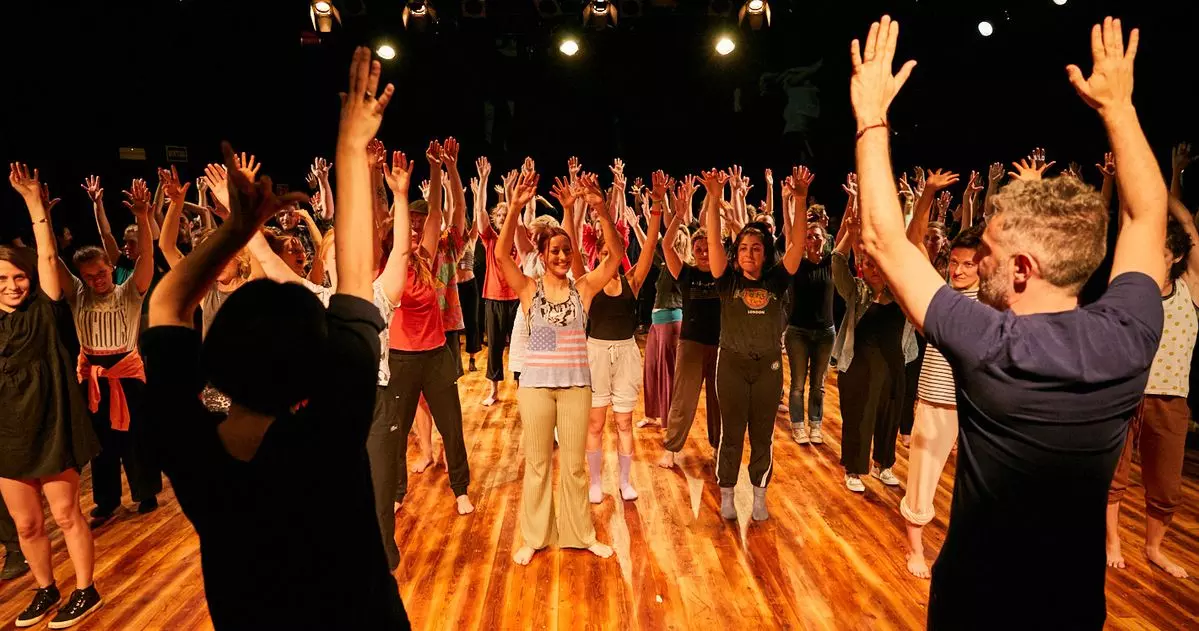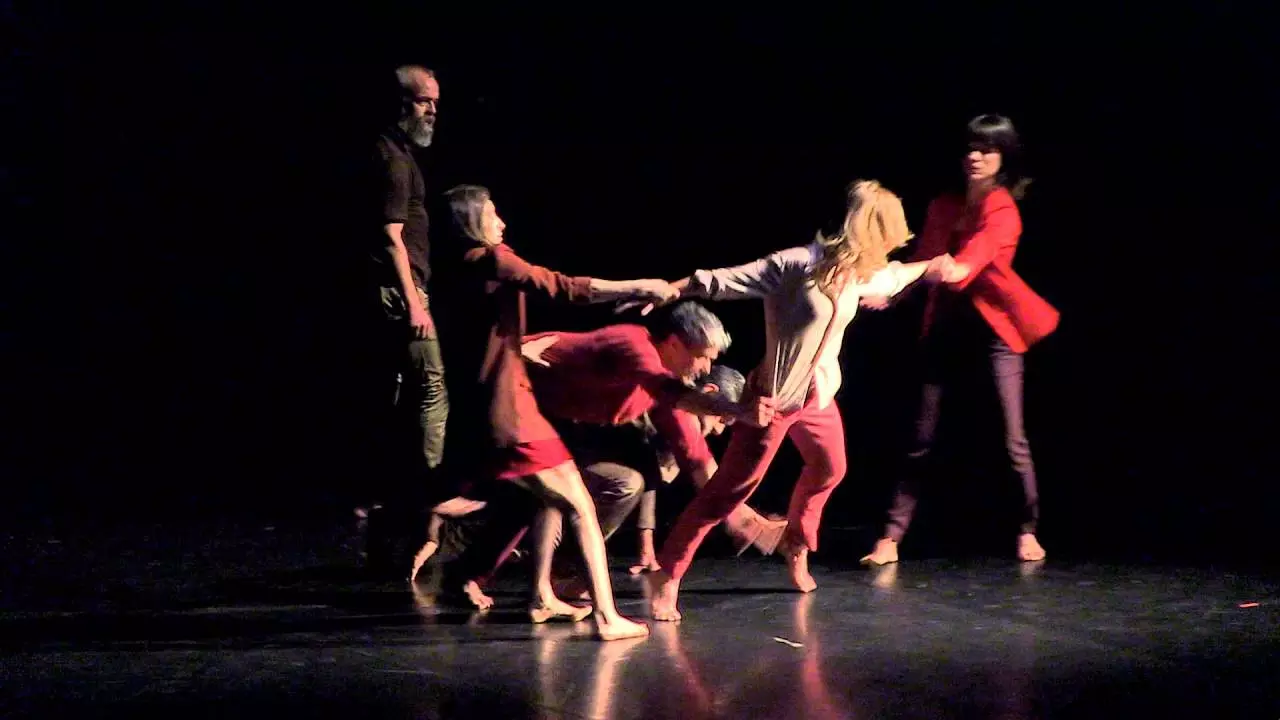- Details
The exercise of questioning and moving things
Interview with Sebastián García Ferro
By Verónica Rodríguez (VR) Rosario June 2022
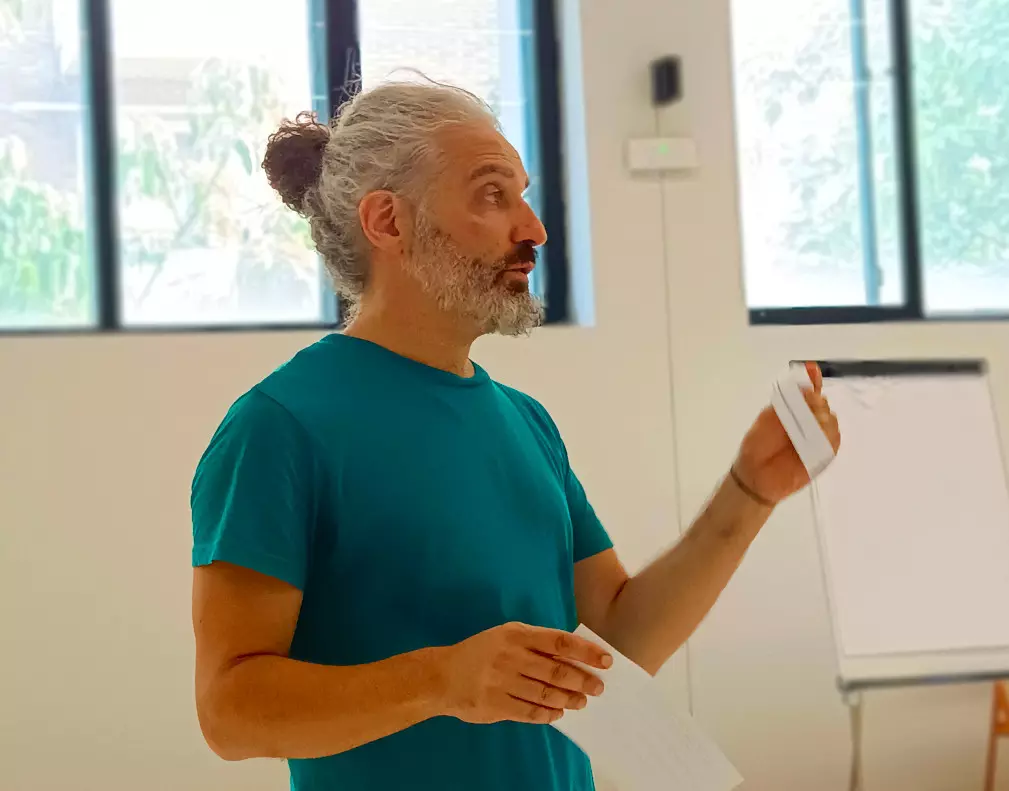
(Photo by Isabel Sobrino)
Sebastián García Ferro, hereinafter SGF, born in Argentina – choreographer, dancer, performer, creator and composer, has been living in the city of Barcelona for more than 18 years. Since 2011 he has worked as an associate artist with the cultural centre La Caldera / Les Corts. He has toured dozens of festivals, meetings, residences, institutions, etc. sharing and exchanging in their creations and projects.
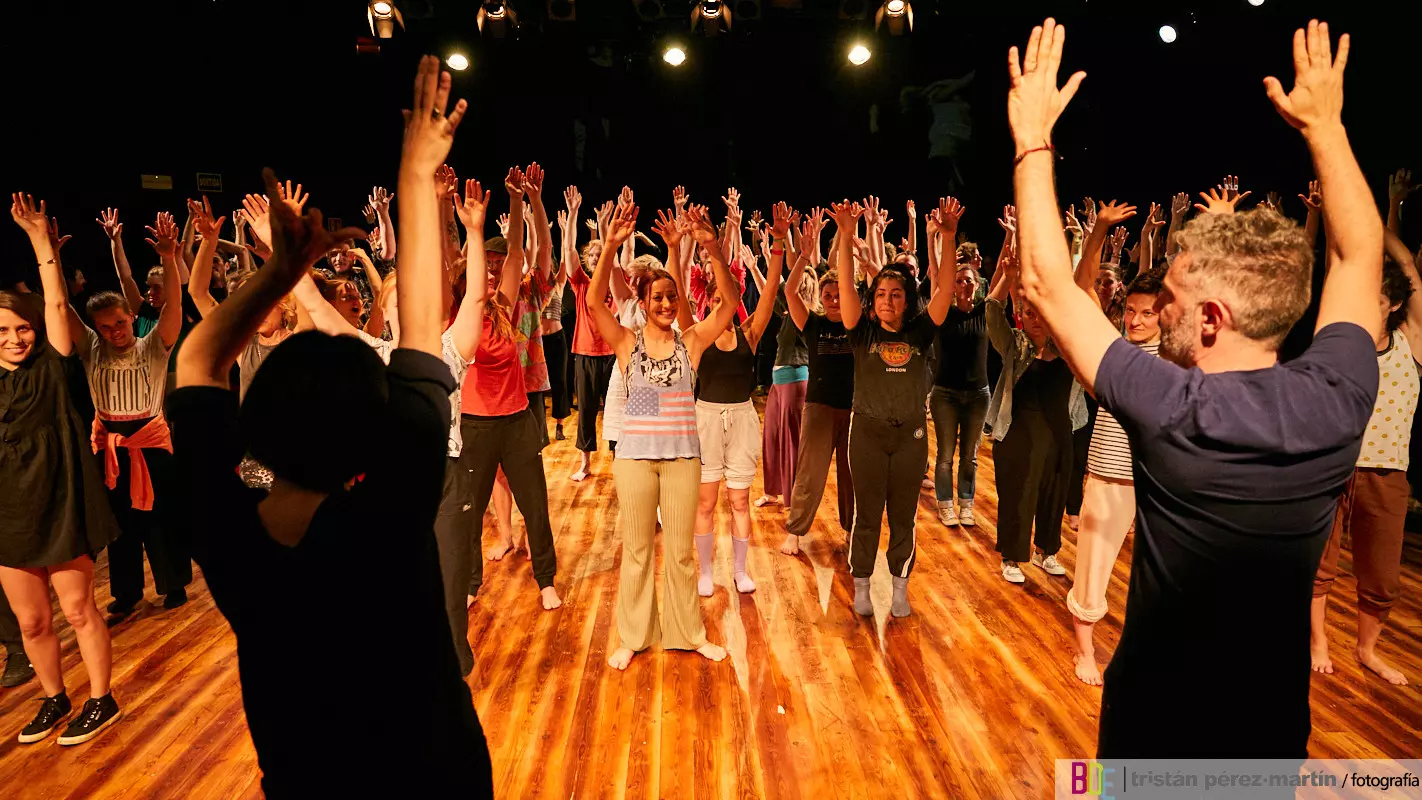
(Photo by Tristán Pérez-Martín)
In this talk with Inquieta, he tells us about his transition to Europe, the development of BIDE (Barcelona International Dance Exchange) and they share questions about the post-pandemic present in the current scene.
A street like the one referred to in Néstor en Bloque's Cumbia song did not separate us, but an ocean and thousands of km does. We connected by video call one early morning for me and one very late siesta for him, hot there, cold here.
Sebastián has a sharp mind, and that's how he operates, he doesn't go unnoticed, he opens doors, he plants seeds that grow and multiply.
Thus, with this enquiring mind, he tells us that when he decided to finally change his country, he had traveled to Europe in the past for projects, he first chose to reside in Brussels. However, taking into account that the stakes were higher than a professional challenge alone, for his life’s work he decided to move to the city of Barcelona where he would find a beautiful climate, friends and energy according to his search.
When asked about the origin of BIDE, http://bidebarcelona.com/en/bide/what-is-bide, SGF reveals two events that strongly influenced this because they were fragmented times for the creators. The first event, ECITE, was a Contact Improvisation (CI) exchange that lasted 10 intensive days in 2006, which together with other CI practitioners would be replicated a few years later in Ibiza.
And the second “that blew my mind”, was a residency “Colina Project at Espacio do Tempo in Montemor o novo, Portugal”, earned through SGF’s participation in the Madrid choreographic contest, in which he had also won the highest prize. It was a program that lasted two weeks in a castle, a former nun's house, with about 30 creators of dance, music, actors, singers, etc. “In which you could propose projects or join as an interpreter. That immediacy meant that you had to be very open.
Thus, from these two experiences and from meeting with Daniel Werner and Ulla Makinenn, they ventured to replicate something of a similar format in Barcelona in 2009. From this launch, year after year, the content and interest would grow and they would incorporate more groups of people and form different work teams.
BIDE is an organisation dedicated to providing programs that facilitate exchanges and mobility between choreographers, dancers, managers and artists through their tool, called B-LAB. The B-LABs are laboratories (similar to workshops) for sharing practices in a non-hierarchical manner; horizontally and transversally.
Another strand of BIDE, is an annual municipal program in Barcelona called B>meeting – with people from many countries. Consisting of 5 intensive days with B-LABs of 6 hours each "with the idea of synergising some of the entities with which we collaborate and providing the participants with other creative tools". In this period of time, an immersive, specific process is ensured, devoted only to that, a reality not so common in our Argentine lands. “In Europe we have that possibility, that way of working allows you to focus on the object of study, [it’s] not more effective but more concrete”.
The project is very broad and seeks to give space to different formats and interests such as B-Talk performance conferences, B-satellites for other cities and other programs, as an introduction to the B-Lab methodology called B>Landing, thought-focused laboratories and others for sharing and exchange of practices.
Another subject that arose in this interview was the generational issue. We are interested in highlighting some data that SGF shares. “We have people who participate from 19 to 23 years old and even people over 60, we have analysed that most people who access dance in terms of workshops and masterclasses are between 27 and 33/34 years old and everything that is before or after is left out. This is an aspect that makes us stand out from other gatherings. 1,200 people have passed through here, for between 50 and 60 projects.”
“BIDE taught me a lot of things, especially how to work within creative processes. Before, I was a person who would enter a rehearsal room and already had 70% of the work pre-determined, which allowed for precision when working with companies or formations where you arrive to go with the thing more or less done.” However, SGF implies that the learning and experience through BIDE has modified his relationship with time and working approaches - "I don't rehearse in the morning anymore, it seems to me an absolute waste of time, the body in the morning is for something else..."
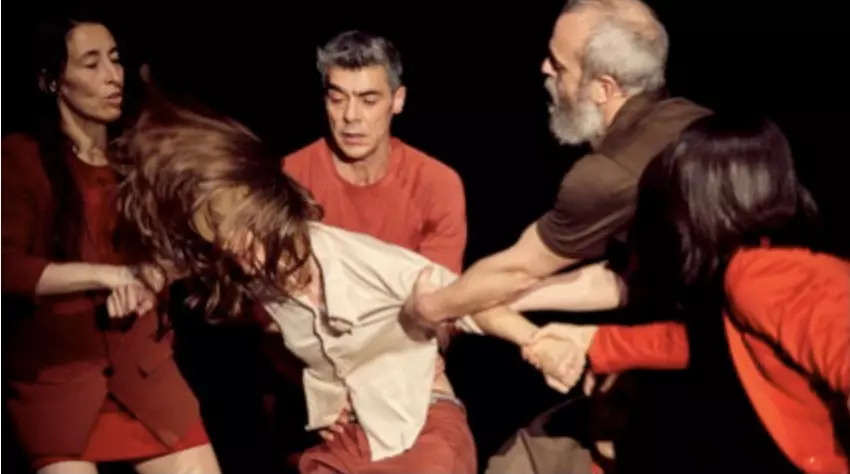
This evokes BIDE’s feedback experience, “At BIDE several B-LABs are done per day and we show a result but we don't know how we got to that result, as it is collaborative, Ulla used to say that it’s like you go to sleep and the body and mind work things out without the intervention of reason”.
I ask him about the male and female dancers "who comb grey hair" in his works, and it is the gateway to learn about one of his most widespread creative processes.
Accustomed to performing contemporary dance pieces with great participation or community dance, +45 was born in 2016, it premiered at the Mercat de las Flors in Barcelona after two weeks of laboratories and 3 months of assembly.
“The idea was to reflect on a body that is maturing, and I took the idea from the word twilight, which in German means sunrise and sunset, what would a twilight hero who is facing maturity look like and where are those bodies today? As the playwright Víctor Molina says when you reach 40 there’s no way to escape; if life gives you lemons, make lemonade.
“I like to create stage devices that, beyond the work we are going to present, involve management and creation. So we brought together 5 cities over different phases in Catalonia and offered workshops for people between 45 and 70 years old for 300 people. And meanwhile we were working with the 6 established dancers and choreographers, from here, with research from laboratories and on the other hand the ensemble material with 60 people.”
(Photo by Tristán Pérez-Martín)
“+45 became a kind of brand with the “+”, because afterwards there were several projects with people who replicated this type of format with many people on stage, and in the end, as a creator, I am interested in creating formats, that is inspiring, I am not one to stay with ideas”
“Each person who came to be part of the ensemble brought people into the theatre. In 2016 and 2017 our company generated the most new audience in Spain. If 60 people come to participate and each one brings 5 or 6 new audience members: multiply them!”
You can talk for hours with SGF and also laugh a lot, but since we don't have a bar table and a drink in between us, we are coming to the end of this talk to reflect on our present, the scene, the questions and dance practices in this post-pandemic world.
“Although there are things in common with us all, because we are a capitalist Western society, each reality has its own tone according to the city you are in, you cannot abstract yourself. Precariousness is happening everywhere, not just in Argentina. There is less and less money to produce and places to show the works and the venues are very dominated by the usual names.”
“Thematically there is a little less desire to mix the contemporary with the popular. Because I insist, the public must go looking for it. I have no prejudices with the popular.
“On a practical level, my view is that complicated times are coming, because there is no clarity now in the immediate future, in which you can see what resources or places there are to show the work.” However, SGF highlights the importance of meeting groups of young people with critical views, so he feels that regeneration is possible. Young people hold a different economic and environmental conscience, because they are living more hostile realities than those of our generation. “At the end of the day, the scenic act in perspective is an area to propose a hypothesis to a thesis that I have. In Upper vol.1, my new piece; I asked myself: what are we standing for?, what are we standing up for?, what is the use? The exercise is questioning from a productive place in the sense that it does not have to give a positive result, but rather it has to stir things.”
“It is a time of great change, and everything is turned upside down, we do not know how it should be. There is a morphology that is not yet triangular or angular. Within so much movement, stopping to think about how to create or why to create will be the task”.
VR and SGF say goodbye until further notice.
Link for the interview in Spanish: https://cobai.org/2022/08/22/el-ejercicio-de-cuestionarse-y-mover-las-cosas-entrevista-a-sebastian-garcia-ferro/
Video: https://www.youtube.com/watch?v=hg0rheHx1wA
- Hits: 1095
